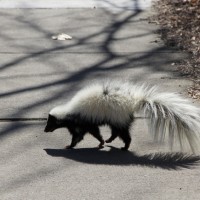The Effects of Skunk Spray on Dogs

While skunks are less aggressive animals, they are usually capable of ejecting an incredibly stinking substance a distance of around 15 feet when provoked. When ejecting the spray, skunks often aim at the intruder`s face. As a result, animals that get skunked tend to take the most of it on their faces. In pets, the effects of skunk spray can be lethal when ingested and when the pet is trapped in an unventilated area where the spray may become concentrated. For purposes of this discussion, this article will focus on the effects of skunk spray on dogs in detail.
What side effects does skunk spray have on dogs?
Depending on the site of spray, the effects of skunk spray can be ocular, oral, respiratory or even dermal. Also, the severity of the symptoms may depend on the part of the body that is sprayed and the nearness of the skunk. The overall symptoms may include:
- Squinting
- Sneezing
- Vomiting
- Drooling
- Ocular (Eyes) swelling and redness
- Temporary blindness
Sometimes, severe reactions may also occur. Skunk sprays contain thiol components which cause oxidative damage to the red blood cells. This results in the destruction of the red blood cells leading to anemia. While supportive treatment may help most affected dogs, death may also result. However, few cases of anemia have been documented. In one case, one dog developed a mild to moderate anemia but recovered with supportive care. In a similar case, another dog manifested severe symptoms of anemia, had a convulsion and died.
It is also imperative to note that the effects skunk sprays may vary from one dog species to another. For instance, Japanese breeds of dogs such as Shiba Inus, Tosus, and Akitas seem to be more susceptible to effects of the spray when compared to other digs.
Other effects of skunk sprays may include pale gums, rapid heart rate, disorientation, abnormal breathing and glassy stare.
